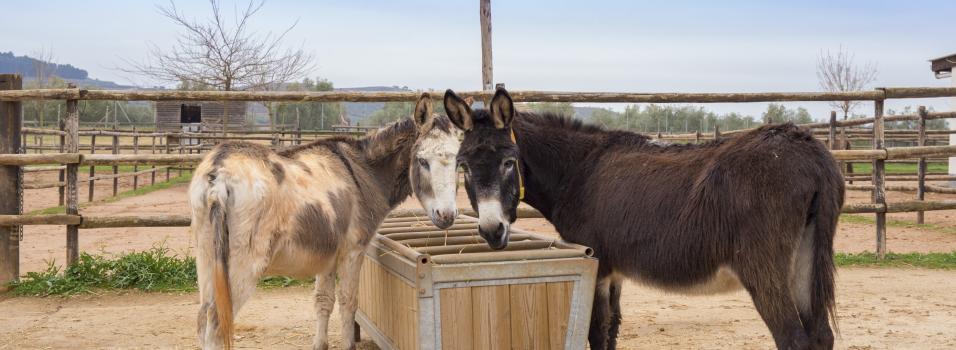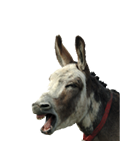Physical and mental enrichment for donkeys
Physical and mental enrichment is essential to the wellbeing of donkeys and mules. Enrichment helps to maintain normal behaviour, prevent problems associated with boredom, ensures their instinctual needs are met, increases exercise and maintains a healthy weight, to name but a few. The goals for enrichment are to increase behavioural diversity and increase positive utilisation of the environment they are in, subsequently increasing their ability to cope with daily challenges and be able to make their own choices. Just think of one thing each day that you could do differently. To help you, in this publication Environment Enrichment for Donkeys you can find a range of ideas, which you could adopt and use at home with your donkeys. See also below for some inventive ideas:
BUILDING CONFIDENCE AND TRUST
One of the most important and simple tasks that you can do to build on the relationship with your donkeys, is to spend time with them, grooming them, picking their feet out and talking to them. A vital part of care for a donkey is simple daily contact, and it is something that is mutually therapeutic for both donkey and owner. So spend some time over the next few weeks, getting to know one another.
KEEPING CURIOUS MINDS ACTIVE
There are many different varieties of enrichment available, from balls to tyres, wellies to ropes, toys can provide mental stimulation for inquisitive donkeys, as well as helping to improve social interactions between donkeys in their herds or pairs. As well as physical toys, you can also use types of feeding enrichment, such as forage boxes, equine feed balls, carrots swedes or turnips hidden throughout their environment so they have to search for the reward themselves. Whilst you should be careful not to overfeed a donkey, providing some of their daily ration in the form of vegetables will help to mentally stimulate the donkey and provide variety in their diet.
INCREASING INVESTIGATION AND EXERCISE
In their natural environment, donkeys spend up to 16 hours a day searching for food, travelling over varied landscapes and looking for watering holes. They have evolved to travel up to 12 miles a day in search of sparse vegetation. This search for food and the environment in which the donkey lived, kept them mentally stimulated, fit and lean. The domesticated donkey lives in a much more restricted environment. As a result of these restrictions, domestication can cause donkeys to exhibit unwanted behaviours, such as chewing, or being overly exuberant in their behaviour. Where possible, you want to increase the space your donkeys have to roam, whether that be access to additional grazing, or setting up a track system where your donkeys can graze different areas each day. You can also change how the food is delivered to the donkeys, such as creating forage boxes, hiding carrots in logs and even using herbal teas to flavour some of their drinking water. Certain herbs and spices can also be utilised, to engage the senses and excite the mind. Spices such as turmeric and paprika, or some mixed herbs, placed on the ground for your donkeys to smell and explore, goes a long way to keeping them entertained. There are many more enrichment ideas on the Environment Enrichment for Donkeys publication, so please take a look on it to see what activities would suit you and your donkeys. If you are unsure, or have any questions, then the charirty’s team of Donkey Welfare Advisers are always on hand to offer support to owners. They have seen many creative and novel ways to increase enrichment opportunities within the home and they would be more than happy to share this information with you and come with new ways to keep your donkeys happy, healthy and active.




